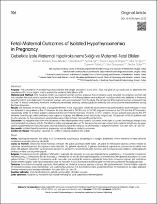| dc.contributor.author | Akbaba, Gülhan | |
| dc.contributor.author | Akbaba, Eren | |
| dc.contributor.author | Berker, Dilek | |
| dc.contributor.author | Işık, Serhat | |
| dc.contributor.author | Ayçiçek Doğan, Berçem | |
| dc.contributor.author | Özuǧuz, Ufuk | |
| dc.contributor.author | Tütüncü, Yasemin | |
| dc.contributor.author | Danışman, Nuri | |
| dc.contributor.author | Güler, Serdar | |
| dc.date.accessioned | 2019-05-13T09:03:09Z | |
| dc.date.available | 2019-05-13T09:03:09Z | |
| dc.date.issued | 2014 | |
| dc.identifier.citation | Akbaba, G., Akbaba, E., Berker, D., Işık, S., Ayçiçek Doğan, B., Özuğuz, U., Tütüncü, Y., Danışman, N., Güler, S. (2014). Fetal-maternal outcomes of isolated hypothyroxinemia in pregnancy. Turkish Journal of Endocrinology andMetabolism, 18(4), 106-110. | en_US |
| dc.identifier.issn | 1301-2193 | |
| dc.identifier.uri | https://doi.org/10.4274/tjem.2520 | |
| dc.identifier.uri | https://hdl.handle.net/11491/1414 | |
| dc.description.abstract | Purpose: The prevalence of isolated hypothyroxinemia (IH) ranges between 1.3 and 30%. Thus, the goal of our study was to determine the prevalence of IH in our region, and to explain the maternal-fetal effects of IH.Material and Method: One hundred-ninety-six pregnant women without previous thyroid disease were included. Six pregnant women did not complete the study due to abortion during the first trimester. All of these patients were euthyroid. Hypothyroidism was detected in three and hyperthyroidism was detected in 2 pregnant women, who were excluded from the study. The remaining 185 pregnant women underwent free T3, free T4, thyroid stimulating hormone, antithyroid peroxidase antibody, antithyroglobulin antibody, and urinary iodine measurements during the three trimesters.Results: We detected IH among 38% of pregnant females in our population. When the assessment was performed for each trimester; IH was not detected in any patient at the 1st trimester, IH was detected in 59/185 and in 50/185 pregnant women at the 2nd and the 3rd trimesters, respectively. While 13 of these patients detected at the last trimester had new onset IH, in 37 of patients, IH was present even during the 2nd trimester. Even though iodine deficiency was higher in IH group, the difference was statistically insignificant. Fifty percent of the 50 patients with IH who returned for the post-partum examination were noted to have improved thyroid function.Discussion: No negative effect of IH was observed on fetal development and obstetric outcomes. In the light of current knowledge, therapy is not recommended for patients with IH. The effect of iodine supplementation on fT4 decrease has not been shown to IH patients should also be given iodine supplementation should be given and the doseshould be the same as recommended to pregnant women. © 2014, Galenos Yayincilik. All rights reserved. | en_US |
| dc.description.abstract | Amaç: İzole hipotiroksinemi (İH) sıklığı %1,3-30 arasında bulunmuştur. Bölgemizde İH sıklığını belirlemek, İH’nin maternal ve fetal etkilerini incelemek amacıyla çalışmayı planladık. Gereç ve Yöntem: Öncesinde tiroid hastalığı olmayan 196 gebe çalışmaya dahil edildi. Altı gebe ilk trimesterde abortus olması nedeni ile çalışmayı tamamlayamadı. Bu olguların tümü ötiroiddi. Üç gebede hipotiroidi, 2 gebede hipertiroidi saptandı ve çalışma dışı bırakıldı. Geri kalan 185 gebenin tamamının üç trimesterde serbest T3, serbest T4, tiroidi stimüle eden hormon, anti-tiroid peroksidaz antikoru, antitiroglobulin
antikoru ve idrar iyot ölçümleri yapıldı. Bulgular: Popülasyonumuzda gebelerin %38’inde İH saptadık. Her trimester için ayrı ayrı değerlendirme yapıldığında; 1. trimesterde İH saptanan hastamız yoktu, 2. trimesterde 59/185 hastada, 3. trimesterde ise 50/185 hastada İH saptandı. Son trimesterde İH saptanan hastaların 13’ü yeni
gelişen İH iken, 37 hastada 2. trimesterde de İH mevcuttu. İyot eksikliği İH saptanan gebelerde daha fazla olmasına rağmen fark istatistiksel olarak anlamlı değildi. İzole hipotiroksinemisi olan 50 hastanın %50’si postpartum kontrole geldi ve tiroid fonksiyonlarının düzeldiği görüldü. Tartışma: İzole hipotiroksinemili olgularda, fetal gelişim ve obstetrik sonuçlar üzerine olumsuz etki gözlenmemiştir. Güncel bilgiler ışığında IH hastalarına tedavi önerilmemektedir. İyot suplementasyonunun fT4 düşmelerine etkisi gösterilememiştir. IH hastalarına da diğer gebelere önerilen miktarda iyod desteği verilmelidir. | en_US |
| dc.language.iso | eng | |
| dc.publisher | Galenos Yayıncılık | en_US |
| dc.relation.isversionof | 10.4274/tjem.2520 | en_US |
| dc.rights | info:eu-repo/semantics/openAccess | en_US |
| dc.subject | Iodine Deficiency | en_US |
| dc.subject | Pregnancy | en_US |
| dc.subject | Obstetric Outcomes | en_US |
| dc.subject | Isolated Hypothyroxinemia | en_US |
| dc.subject | İzole Hipotiroksinemi | en_US |
| dc.subject | Gebelik | en_US |
| dc.subject | İyot Eksikliği | en_US |
| dc.subject | Obstetrik Sonuçlar | en_US |
| dc.title | Fetal-maternal outcomes of isolated hypothyroxinemia in pregnancy | en_US |
| dc.title.alternative | Gebelikte izole maternal hipotiroksinemi sıklığı ve maternal-fetal etkileri | en_US |
| dc.type | article | en_US |
| dc.relation.journal | Turkish Journal of Endocrinology and Metabolism | en_US |
| dc.department | Hitit Üniversitesi, Tıp Fakültesi, Dahili Tıp Bilimleri Bölümü | en_US |
| dc.identifier.volume | 18 | en_US |
| dc.identifier.issue | 4 | en_US |
| dc.identifier.startpage | 106 | en_US |
| dc.identifier.endpage | 110 | en_US |
| dc.relation.publicationcategory | Makale - Uluslararası Hakemli Dergi - Kurum Öğretim Elemanı | en_US |


















